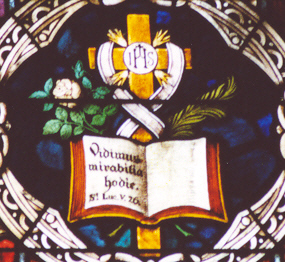
Speak Lord, Your Servant is Listening
Return to
Index The Catholic Faith
Return to Level
Two Topic Index
Home Page
The Introductory Rites of the Mass involve our speaking to God. We pray for God's forgiveness in the Penitential Rite, praise his goodness in the Gloria, and pray the Collect. The next part of the Mass, the Liturgy of the Word, is just the opposite: now God speaks to us!
At Sunday Mass there are three readings from the Bible. The First Reading is usually from the Old Testament. (During the Easter season it is from the Acts of the Apostles). From the Old Testament we learn the history of creation and of God's chosen people, the Hebrews. Sometimes we hear prophecies of the coming of the Savior. And many Old Testament events foreshadow the Gospel. For example, the Passover lamb foretells, or pre-figures, the Holy Eucharist.

The First Reading is followed by the Responsorial Psalm, the reading or singing of a Psalm with a refrain that we repeat. The Psalms express every kind of prayer: praise, thanksgiving, reparation for sin, and petition.
The Second Reading comes from the Epistles (letters) that the apostles wrote to the first Christian Churches. Some of the advice was very practical, such as what to do with collection money or how to deal with troublemakers. But for the most part the letters discuss how to grow in holiness, how to pray, and how to treat the people around us with true Christian charity.
Next we stand for the Gospel, to show our reverence for the words of Jesus. After we recite or sing the Alleluia verse, the priest says: "The Lord be with you." The people answer: "And also with you." The priest goes on to say: "A reading from the holy Gospel according to Matthew" (or Mark, Luke, or John). Then the priest makes the sign of the Cross on the Lectionary, and then on his forehead, lips, and heart. The people do the same as they answer: "Glory to you, Lord." The little crosses indicate that the word of our Lord is to be in our thoughts, on our lips, and in our hearts.
We hear the Gospel readings again and again, and we may be quite familiar with them. Why go over them so many times? The Gospels are the record of what Jesus said and did on earth. Listening again and again to the teachings of Jesus or the stories about his miracles is a way to spend time with him, to know and love him better. The more we think about Jesus' life and words, the more we learn about him. We can never go over the gospels too many times; for every word and action is the word and action of God himself as he lived and walked among men.
So we must try not to drift off into daydreams during a familiar reading; God gives us special graces if we listen when he speaks to us. In fact, we share the privilege of the disciples, to whom Jesus said; "Blest are the eyes that see what you see. I tell you, many prophets and kings wished to see what you see but did not see it, and to hear what you hear but did not hear it" (Lk 10:23-24).
Our Lord was talking about his own words and actions. He included in this privilege not only those who lived with him but all the people down through the ages who would do their best to get to know him by studying the accounts of his life, guided by the teaching and tradition of the Church.
Next comes the Homily, or Sermon. The readings and Psalm we have heard have been chosen to illustrate a theme. This theme may be developed by the priest in his Homily, and the meaning of Jesus' words and actions, which is sometimes hard to understand, is explained in light of the Church's teaching. The priest may talk about how we can apply what Jesus said and did to our own lives, and how understanding the Gospel can help us decide how to think and act.
At Sunday Mass, and on holy days or solemn (special) feasts, the Sermon is followed by the Creed, recited by everyone together. The Creed is a statement of what all Catholics believe. We have listened to Sacred Scripture, and the priest has explained it and applied it to practical cases; now it is time to express our faith in what God has revealed and taught us. In reciting the Creed we testify that we believe what God has revealed to men. We worship God, the author of all truth, with our minds.
The Creed is followed by the General Intercessions or Prayers of the Faithful. These prayers are for the needs of the Church, for our public authorities, for the salvation of the world, for those oppressed by any need, and for our local community and families. This concludes the Liturgy of the Word.
"Man shall not live by bread alone, but by every word that proceeds from the mouth of God." (Matthew 4:4)
Used with the permission of The Ignatius Press 800-799-5534
Return to
Index The Catholic Faith
Return to Level
Two Topic Index
Top
Home Page